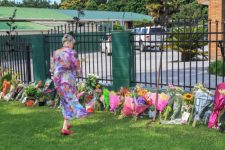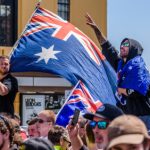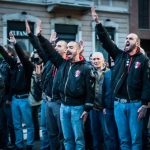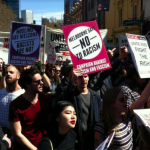Right-Wing Extremists: The Real Terrorism Threat

The horrific massacre in two Christchurch mosques which was allegedly perpetrated by Australian white supremacist Brentan Tarrant has led to calls for a renewed focus on right-wing terrorism.
On 15 March 2019, Tarrant allegedly slaughtered 49 defenceless people, including children, during prayer on Islam’s holy day of Friday. Another child was killed in the area.
In his 73-page manifesto, the suspected terrorist flags his intention to take revenge on Muslims on the basis that immigration amounts to “an assault on the European people.”
He engages in a seemingly endless diatribe against immigration in general, and Muslims in particular, describing himself as a “regular white man” defending his beliefs.
“The origins of my language is European, my culture is European, my political beliefs are European, my philosophical beliefs are European, my identity is European and, most importantly, my blood is European” he writes.
The suspected terrorist uses symbolism to paint a false historical narrative about the supposed victimisation of his people and the glory days of the “white” race. He attempts to propagate the myth that immigrants are responsible for the downfall of society and his own miserable situation.
The anti-immigration, neo-fascist rhetoric is entirely consistent with that used by many right wing groups with live, public social media pages in Australia and across the globe.
These groups typically attempt to portray themselves as victims and blame others for their own failings, while claiming to be patriots and nationalists.
Tragically, the Christchurch massacre is just the latest in a long list of terrorist acts committed by right-wing extremists across the globe.
Political Response
Prime Minister Scott Morrison called the massacre a “vicious and callous right-wing, extremist attack”, warning Australians to be “alert and aware” of further acts of domestic terrorism.
Morrison made clear that while New Zealand is leading the investigation into the massacre, Australia has launched its own investigation into Tarrant – focusing on whether others he associates with are capable of committing further atrocities.
Commissioner Michael Fuller has told the media that “We have arrested right-wing extremists in this state,” adding “We have criminal orders against right-wing extremists… We take it seriously.”
Growing danger
Victoria University’s Dr Debra Smith has similarly described right-wing extremism as a “growing threat” in Australia.
She explains that right-wing leaders are exploiting concerns about immigration held by more moderate members of the community, often succeeding in heightening their fears and animosity towards foreigners through falsely ascribing them with the blame for society’s and their own personal failing.
“What research [shows is] that anti-Islamic rhetoric is being used as a strategic tool by the far-right to recruit people into the movement,” she remarked.
Dr Smith says that while social media is creating dangerous “echo chambers”, research suggests that around 85% of those recruited have real-world contact with existing extremists, and are easy prey.
And professor Geoff Dean from Griffith University believes the normalisation by the media of right-wing extremist views has enabled these groups to become increasingly extreme and violent, and successfully divide the community.
“They want to create a community out of fear” and create an “us vs them” discourse by blaming Muslims, the professor explains. He points out that the narrative is without factual basis, and that those who represent just over 2% of Australians (Muslim people) and who are overwhelmingly law-abiding and productive are being blamed for the nation’s economic and social problems.
Foiled domestic attacks
Commissioner Fuller makes clear that Australia is fortunate to have escaped massacres on similar scales to the one experienced in New Zealand.
In August 2016, Phillip Galea – who has strong links to far right-wing organisations such as the United Patriots Front and Combat 18 – was charged with several terrorist offences after conducting “surveillance” upon “left-wing premises” and allegedly planning to carry out bombings. Explosive ingredients were found at Galea’s home.
This was a year after Galea was arrested for similar conduct and treated extremely leniently by both police and the courts. On that occasion, police charged him with possession of a prohibited weapon after he was found with five tasers, a jar of mercury, bomb-making guides and a manual about how to make explosives and illicit drugs.
He was ultimately sentenced to just one month in prison and given a $5,000 fine for conduct which, many believe, would have resulted in terrorism charges attracting a maximum sentence of life imprisonment if it were a person of the Muslim faith.
Another radicalised white supremacist, Michael Holt, was convicted in 2017 after threatening to carry out a mass shooting at Westfield Shopping Centre in Tuggerah.
He had manufactured home-made guns, knuckle dusters and slingshots in his grandfather’s garage for the purpose of carrying out the massacre.
Radicalisation propaganda
Harvard University researcher Benjamin Decker has found that social media strategies used by right-wing terrorists such as Tarrant are becoming increasingly sophisticated and more difficult to detect.
Tarrant, for instance, uploaded his 73-page manifesto through anonymous file sharing services, presumably in order to conceal it from government agencies.
Mr Decker suggests that right-wing websites and social media pages should be censored in the same way as jihadist ones, and that the mainstream media should actively reduce its contribution to normalising right-wing hate speech.
The researcher adds that, “We should stop sharing screenshots or links to shooter’s own brand of recruitment propaganda.
“It further propagates his beliefs in the hope that he might inspire others — we, the media, cannot allow him to bask in that glory and fulfil his ambitions.”
It is hoped that recognising right-wing extremists for what they are, rather than giving them air time and a sympathetic ear, will reduce the likelihood of a Christchurch-style attack occurring within our borders.







